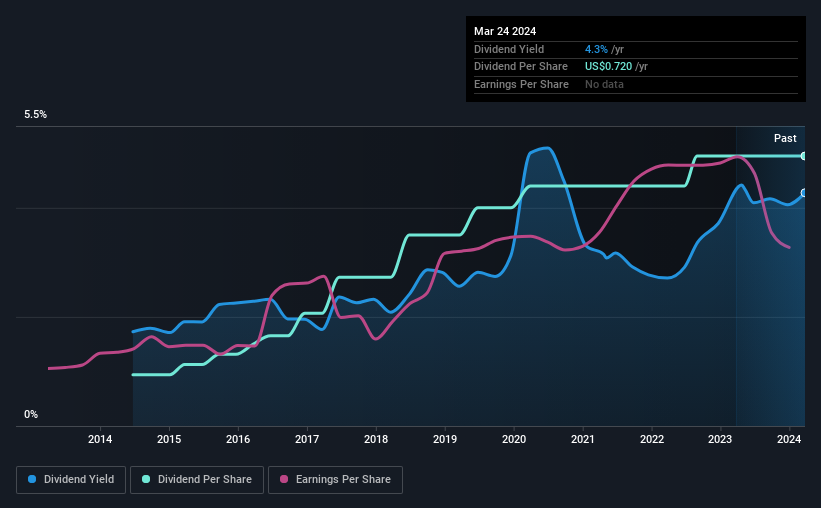The board of Parke Bancorp, Inc. (NASDAQ:PKBK) has announced that it will pay a dividend of $0.18 per share on the 19th of April. This makes the dividend yield 4.3%, which will augment investor returns quite nicely.
View our latest analysis for Parke Bancorp
Parke Bancorp's Payment Expected To Have Solid Earnings Coverage
While it is great to have a strong dividend yield, we should also consider whether the payment is sustainable.
Having distributed dividends for at least 10 years, Parke Bancorp has a long history of paying out a part of its earnings to shareholders. Past distributions do not necessarily guarantee future ones, but Parke Bancorp's payout ratio of 30% is a good sign as this means that earnings decently cover dividends.
If the trend of the last few years continues, EPS will grow by 0.7% over the next 12 months. If the dividend continues along recent trends, we estimate the future payout ratio will be 35%, which is in the range that makes us comfortable with the sustainability of the dividend.

Parke Bancorp Has A Solid Track Record
The company has an extended history of paying stable dividends. The dividend has gone from an annual total of $0.137 in 2014 to the most recent total annual payment of $0.72. This means that it has been growing its distributions at 18% per annum over that time. We can see that payments have shown some very nice upward momentum without faltering, which provides some reassurance that future payments will also be reliable.
Parke Bancorp May Find It Hard To Grow The Dividend
Investors could be attracted to the stock based on the quality of its payment history. Unfortunately, Parke Bancorp's earnings per share has been essentially flat over the past five years, which means the dividend may not be increased each year. Earnings growth is slow, but on the plus side, the dividend payout ratio is low and dividends could grow faster than earnings, if the company decides to increase its payout ratio.
We Really Like Parke Bancorp's Dividend
Overall, we think that this is a great income investment, and we think that maintaining the dividend this year may have been a conservative choice. The company is easily earning enough to cover its dividend payments and it is great to see that these earnings are being translated into cash flow. All in all, this checks a lot of the boxes we look for when choosing an income stock.
Companies possessing a stable dividend policy will likely enjoy greater investor interest than those suffering from a more inconsistent approach. At the same time, there are other factors our readers should be conscious of before pouring capital into a stock. For instance, we've picked out 1 warning sign for Parke Bancorp that investors should take into consideration. Looking for more high-yielding dividend ideas? Try our collection of strong dividend payers.
New: Manage All Your Stock Portfolios in One Place
We've created the ultimate portfolio companion for stock investors, and it's free.
• Connect an unlimited number of Portfolios and see your total in one currency
• Be alerted to new Warning Signs or Risks via email or mobile
• Track the Fair Value of your stocks
Have feedback on this article? Concerned about the content? Get in touch with us directly. Alternatively, email editorial-team (at) simplywallst.com.
This article by Simply Wall St is general in nature. We provide commentary based on historical data and analyst forecasts only using an unbiased methodology and our articles are not intended to be financial advice. It does not constitute a recommendation to buy or sell any stock, and does not take account of your objectives, or your financial situation. We aim to bring you long-term focused analysis driven by fundamental data. Note that our analysis may not factor in the latest price-sensitive company announcements or qualitative material. Simply Wall St has no position in any stocks mentioned.
About NasdaqCM:PKBK
Parke Bancorp
Operates as the bank holding company for Parke Bank that provides personal and business financial services to individuals and small to mid-sized businesses.
Flawless balance sheet, good value and pays a dividend.
Similar Companies
Market Insights
Community Narratives



